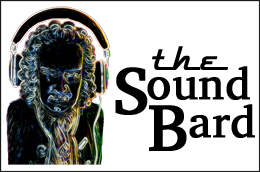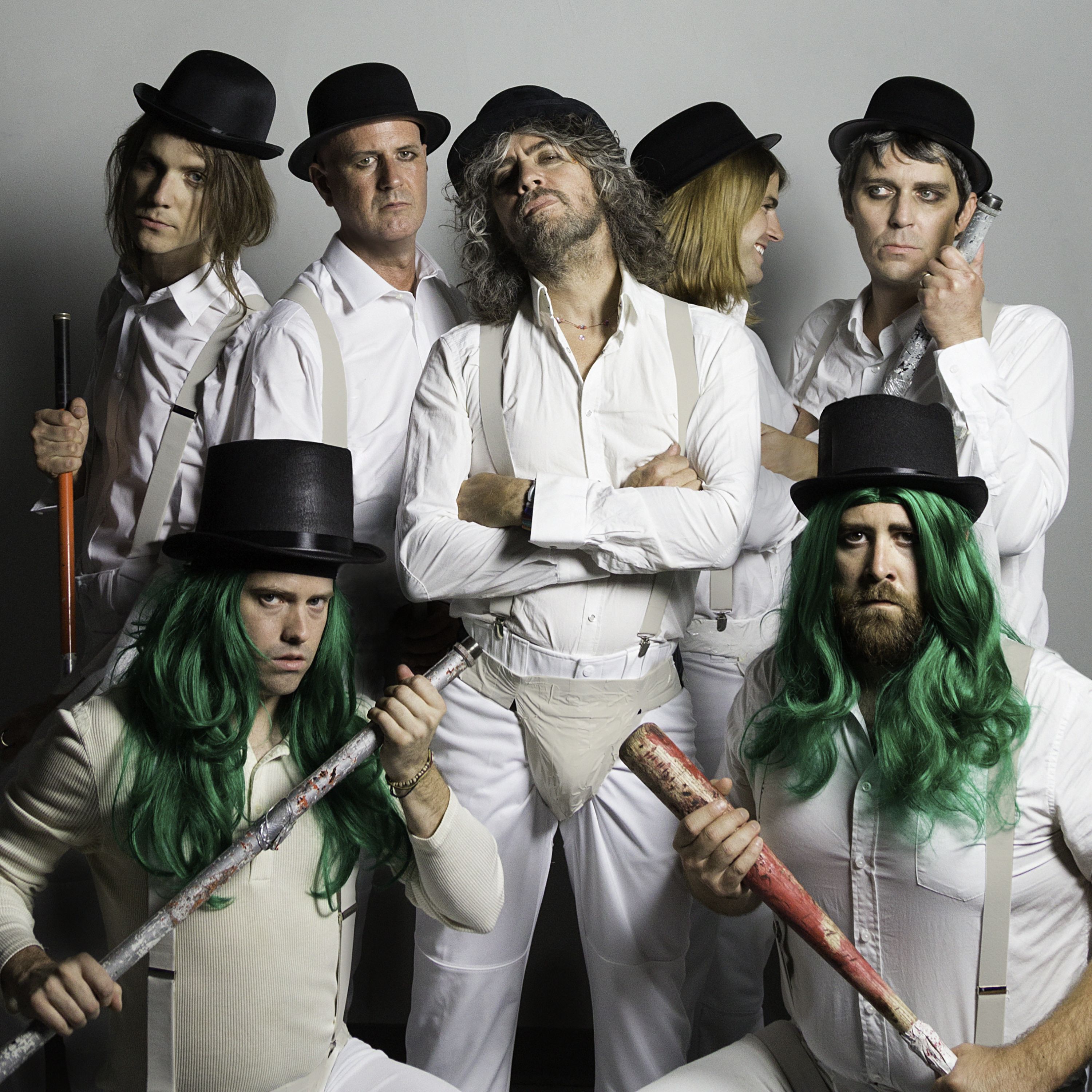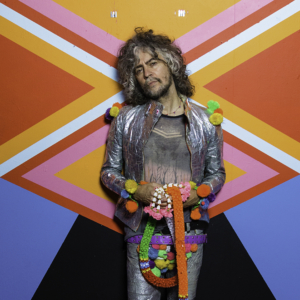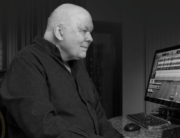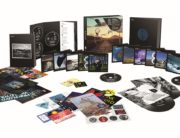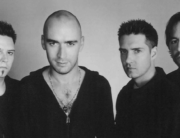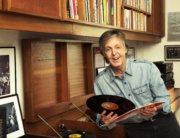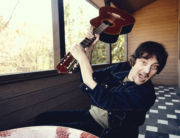BY MIKE METTLER – JANUARY 14, 2017
When it comes to creating music that pushes the sonic envelope, Wayne Coyne and The Flaming Lips have been on the literal cutting edge of aural adventurousness for decades. Their new album, the evocatively titled Oczy Mlody — available now in various formats from Warner Bros., including a hi-res 96/24 download — continues that trend, with 57-plus minutes of music that tests the limits of the stereo soundfield.
Exclusively here on The SoundBard, Coyne and I discuss when and when not to utilize live surround sound, the potential of hi-res streaming, when (and where) hearing distortion can be a good thing, the joys of working with Miley Cyrus, and how the band’s use of orchestral plug-ins have fooled even the most discerning of ears..
Mike Mettler: We’ve talked about this in previous interviews, but especially with a record as expansive as Oczy Mlody that has such a wide dynamic range, it seems almost criminal to contain it to a low-grade, MP3 presentation. I wound up syncing your official Oczy videos on YouTube with the hi-res downloads so I could get the better audio quality while I watched them.
Wayne Coyne: (laughs) You know, I guess I’ve never thought of YouTube as being that lo-fi. Usually, since I travel a lot, I’m listening to things out of my phone speaker anyway. I’m always just glad it seems like it works! But your take is, there is a difference.
Mettler: I think so. We’ve talked about the hi-res and surround mixes you’ve guys have done in the past, and since there is such a wide dynamic range on this album, it almost seems like stereo is holding it back a bit.
Coyne: (chuckles) Well, we do believe that it works because we have just two ears! But we’ve always experimented with surround sound, and we believe we made breakthroughs with sound coming from below and above you. It’s very particular to where you’re standing, or your state of mind (MM laughs), or whether you care about any of that.
But I do think people always respond to good sound, whether they think it’s good or not. Most records nowadays — it’s not hard to get great sound for them. It’s pretty great. A long time ago, it was difficult to get it, but there are plenty of gadgets and gear out there now to help you do that.
Mettler: That is a good point. Considering what happens in Dolby Atmos theaters, you could even do a 360-degree presentation if you were so inclined.
Coyne: Even at the height of the things that Pink Floyd would do, I also remember people talking about some things that would happen at Rush concerts — but they would really just be moments throughout the concerts. They wouldn’t run all the way through it. I guess they used a quadraphonic system, or something.
Mettler: That’s right — Pink Floyd pioneered the use of live quad.
Coyne: The one thing is, you don’t want people to turn around. You want their attention looking at you. You don’t want them to turn around and go, “Oh, I wonder what’s happening back there.” But I think they like it as a moment, and going, “Oh, this is filling in all around me.”
It’s a strange perception thing. What you’re looking at is usually what you want to be listening to. Sometimes, it’s alarming to people to say, “Hey, what was that behind me?” (laughs)
Mettler: Yeah, it’s like a drive-by, or something like that.
Coyne: It is, in a way. I just got through driving for an hour in L.A. in traffic, listening to music and listening to the rain, and, you know — you have to be hyper-aware sometimes. And I don’t like to listen to loud music when I’m driving, because you have all of these signals going on in front of you and behind you, and that can be a distraction.
Mettler: That’s true, especially when you’re driving in L.A., or New York, or even Las Vegas, where I am right now — which I think happens to be the perfect backdrop for listening to an Oczy Mlody song like “Listening to the Frogs With Demon Eyes.”
Coyne: Oh, well, thank you — that sounds like a cool experience!
Mettler: It is! And speaking of Pink Floyd, I think of “Frogs” as being like “Arnold Layne” in its spaghetti western version.
Coyne: (laughs heartily) Well, I will take some lengths to remember that! Though some of the people I’m talking to wouldn’t have the older classic rock references like that — but certainly I do, and so do you. And that’s a great, great compliment, for sure.
 Mettler: Please partake and share with whomever you wish. (Coyne laughs) In terms of another listening arena, we now live in a streaming universe, and you guys are huge in that world. How do you feel about people streaming this record?
Mettler: Please partake and share with whomever you wish. (Coyne laughs) In terms of another listening arena, we now live in a streaming universe, and you guys are huge in that world. How do you feel about people streaming this record?
Coyne: I think people struggle with this all of the time. You want it to be as convenient and as easy as you can make it, and you also want it to sound good, so you’re always struggling with quality versus convenience. But I think all of the streaming services sound remarkably great, and most of them work remarkably well, most of the time.
I mean, we travel so much and we’re often sitting on airplanes, so streaming isn’t something we can think about, because you can’t always listen to something the exact moment you want to when you have no wi-fi. But most people don’t have that dilemma — they’re sitting in their office or in their house, or in the same type of listening environment most of the time.
I think it’s amazing, and I hope more and more people are open to listening in many different ways, from streaming to downloading to vinyl. You can do all kinds of ways. There isn’t just one way to say you’re doing it “right” or “wrong.”
Mettler: That’s the best way of putting it. You can access Flaming Lips music anywhere you want, and now that they’ve announced hi-res streaming, listeners can go that whole route if they choose to. There’s no compromise needed.
Coyne: Yeah! I think what people don’t like about streaming is that it can use up all of your wi-fi or your data plan, but it is getting easier and cheaper, just like you were talking about. You can get it anywhere where it sounds great as well.
But I remember when I was quite young, and my brother’s friends had some reasonably hi-fi systems, and we would listen to Beatles records on them. And we would also listen on my mother’s old AM radio in her kitchen, on one high-endy broken-down distorted speaker.
I still love listening to songs like that. There’s room for a thousand different listening experiences. I remember hearing a Whitney Houston song on a sort of distorted — you know, when you’re out pumping gas, on one of those big things, where there’s music pumping in from those speakers above you. It wasn’t that long ago I was hearing that Whitney Houston song really distorted that way, and I thought it was a remix! (MM laughs) But no, it was just that the speakers were distorted — and I really liked it, you know?
Mettler: Was it “The Greatest Love of All?” That sounds like a cover you have to do. I think The Flaming Lips and Miley Cyrus need to cover that one together. That’s gold, right there. . .
Coyne: (laughs heartily) It wasn’t that one. I think it was “I Wanna Dance With Somebody.” I really thought someone had done a strange remix of it.
Mettler: Well, either way, you guys have to cover it for sure! (Coyne laughs again)
Mettler: Speaking of working with Miley Cyrus, I think you guys have done it again with “We a Famly.” And that line “we both travelin’ ” fits so perfectly right about now, I think.
Coyne: Oh, well, she’s got such a great voice, and it’s easy to get something with her that sounds like it’s full of love.
The track, I have to say, was a little bit complicated for us when we started to do it. She was on tour when we recorded the very first thing we did with her — the “Lucy in the Sky With Diamonds” track we did for The Beatles Sgt. Pepper’s tribute thing [2014’s With a Little Help From My Fwends]. It was in Tulsa, Oklahoma, when she was on the one leg of that big tour [i.e., the Bangerz Tour].
And when she was in Australia, she went into a studio to do a vocal take on a song that was up for a movie, or something like that. While she was in there, we sent her this song — which wasn’t called “We a Famly” then; it was called “Jesus and the Spaceships Demo,” or something like that. It was the very, very beginnings of trying to work out being the song that was at the end of our record, “We a Famly.”
I think the vocal take that’s on the track now, when she first comes in now [at 2:36], was even from that first take from Australia about 3 years ago. It’s something that’s pure and enthusiastic and longing about it.
She and I and some of our engineer friends all listened to that so see if, in a sense, we could recapture what she did there, and we collectively thought, “Well, there’s something on that first take there that’s just perfect.”
The last thing we recorded for it was Miley singing the “we a famly” chorus on there, and the very first thing we recorded that ended up being on this Flaming Lips record was her singing the demo version of it 3 years ago. So it’s pretty remarkable what you can do with technology now.
Mettler: And I think you’re right — when she first comes in on the track, it sounds pure and innocent. Her voice is very girlish and tentative, and that just lends more character to the song overall.
Coyne: Totally! You hit it right — that’s exactly the word. That judgment about what’s “character” and what’s a “mistake” — for me, I hear things like that and I go, “Oh, I like it!” I can’t say why or why not. Sometimes I think that’s the best thing we have to account for — that judgment about, “I don’t know whether that’s right or wrong; I just know that I like it.” And it’s nice when you hear from other people like you who like it the way you do, the way you like that authenticity.
Mettler: That’s the perfect word for it, authenticity. And as you well know, you can play the feel right out of something, especially on a record like this one that’s so experimental and visceral in its vibe. It’s almost hard to sit still when I’m listening to it, because I feel like I should be moving back in forth in some sort of a wave.
Coyne: Oh, thank you! And a vibe is what it is — it’s some kind of cotton candy, mysterious thing. It’s like a lot of things — once you go and try to analyze it, you get lost in the tail of it and can’t find your way back unless you take an outsider’s point of view.
We, as The Flaming Lips, when we’re recording, a lot of times, we’ll have five or six things we’re messing with at the same time, and you’ll come back to something to listen to after a little while, and you can hear that newness and that freshness — that vibe you’re talking about.
But oftentimes, you can get lost in it and forget where its charm is, trying to fix up all the things that are “wrong” with it. I think there’s so much great technology now that those are our dilemmas. Working with Miley, a lot of times, what she’s doing on her very first take is full of some excitement, it’s full of a little caution — it’s all these things you want in a song.
And now, with the technology we have, it’s easy to take out the things that are glaringly wrong or weren’t intended. Music has moved into a really great time where you can keep all the great expressive things, and get rid of the clunky things.
Mettler: Do you subscribe to the rule of “first thought, best thought”?
Coyne: Well, I don’t know if it’s true in all things you should do in your life (both laugh), but a lot of times, if you’re creating music and creating art, something that has a little power and surprise, even for the people who are making it. But for filmmakers who keep refining and refining things, it would be hard to keep a perspective. It’s a wonder any good films, or music, or art, or any of it works — especially when you’re in there working and can see how it easy it is to fuck it all up.
Mettler: And then when you get to the other side of it, there’s a mystery there where you go, “How the fuck did that just happen? I don’t know, but let’s just leave it alone. It just happened.”
Coyne: I think if you’re lucky, those kinds of things are just happening as you go, and you grab them. I always say most of our records are full of 200, 300 lucky accidents. (MM laughs) And we’ve gotten rid of all the boring stuff that no one would want to hear in between them.
Mettler: Then I feel like one lucky listener, because I’ve got 60-odd minutes of fantastic accidents here, which we’ll also be able to get in this great purple- and orange-colored vinyl package…
Coyne: Oh yeah. Not everybody is so in love with that stuff, but we love all of the formats. That’s one of the great things that’s happening at the moment. It’s more accepted, it’s easier to do a variety of things, and even the way the packaging with the big album covers — it’s just stunning. The inks, the shine on the posters; all the little things. And to have it all come together where you can hold it and behold it in your hand there — it’s wonderful. Thank you.
Mettler: It’s a smorgasbord of choice. If you want digital, we’ve got that over here. You want physical, we’ve got that too. You want a CD to thrown on in the car, we’ve got that over there. You’re full service. I know we’re getting close to the end, so, quickly — we hear some strings on “Listening to Frogs.” Are those sampled, or were you able to put together an orchestra this time around?
 Coyne: Most of the stuff we’re able to do now comes from playing with these modules, these plug-in things. They sound amazing. When we did a lot of the orchestration that would up being on The Soft Bulletin way back in 1999, it was the very, very beginning of these really great-sounding modules. I mean, you still have to play 200 tracks and overdub them a lot, which is something we really kind of embraced.
Coyne: Most of the stuff we’re able to do now comes from playing with these modules, these plug-in things. They sound amazing. When we did a lot of the orchestration that would up being on The Soft Bulletin way back in 1999, it was the very, very beginning of these really great-sounding modules. I mean, you still have to play 200 tracks and overdub them a lot, which is something we really kind of embraced.
People will listen to the strings on The Soft Bulletin now, and they’re convinced a real orchestra is on there. We play with real orchestras all of the time, and they’ll congratulate us on recording a really good live orchestra. Sometimes we feel sort of embarrassed to tell them it’s not a real orchestra.
Mettler: You just have to make up the name of an orchestra for them is all. . .
Coyne: (chuckles) We’ve regretted that we’ve kind of tricked them into thinking it’s real, but I think some of it absolutely sounds like a real orchestra. And that’s part of our vibe, you know?
Mettler: Yes yes, so we’re right at the end, so I have to say I think my favorite line on the record is, “It should be loud as fuck!” [from “There Should Be Unicorns”]. As an instruction for everybody who listens to it, I think it should be loud as fuck. That’s my final thought.
Coyne: (laughs heartily) Well, I agree. I agree! Thank you! And thanks, that was a fun conversation.
